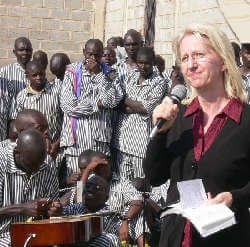
CBI students in developed countries like the U.S. or Australia may struggle to acquire Bibles, but the challenge is not insurmountable. In prisons in the developing world, however, where even food, soap and other basic necessities are scarce, the situation is drastically different.
When visiting CBI Zambia, CBI’s Cynthia Williams discovered firsthand that the 50 initial CBI students at Lusaka Central Prison had to share two Bibles, which were stored in the facility’s “library,” a small, dirty, minimally-furnished room. Many students struggled to finish their work in a timely manner.
Crossroad has always provided free Bibles for students who need them, requesting $2, or the equivalent in stamps, to cover postage costs. For truly indigent students, CBI waves the postage cost and sends Bibles free of charge. But it quickly became apparent that in countries such as Zambia, all prisoners are indigent, and Bibles are in extremely short supply.
To meet this need, CBI is implementing the Bibles for Prisoners program in all of the satellite campuses in developing countries. Boxes of Bibles have already been sent to CBI Zambia, CBI Kenya and CBI Nicaragua, and the satellite campus leaders have relayed their own and students’ enthusiasm and gratitude. CBI Zambia Director Gilbert Mwamba stated confidently, “I believe that our work will be more effective now.”
Williams notes that the students’ work and timeliness immediately improved upon receipt of the Bibles. The satellite campus directors, continually confronted by the challenges of limited funds and resources, have been encouraged by the provision of the Bibles, and their partnership with CBI headquarters has been strengthened. CBI President David Schuringa comments, “I think of the comfort the Word is to those who are living in desperate and difficult prison conditions. Their Bibles may be the only thing of value they own.”












